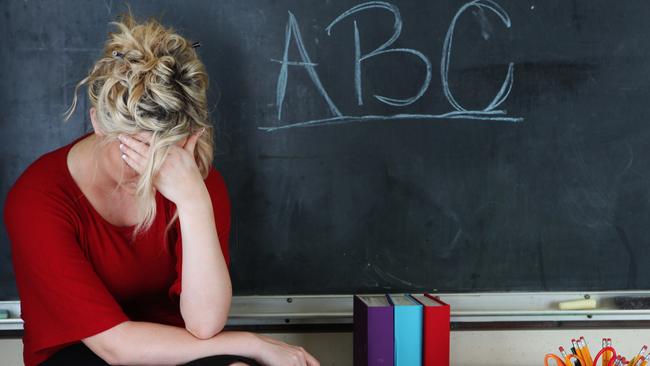SA public school principals vent frustrations over dud teachers and Education Department’s focus on NAPLAN
Bad teachers stay in the system because the process for managing them is just too hard, SA school principals say. And they’re not happy about NAPLAN either.
National
Don't miss out on the headlines from National. Followed categories will be added to My News.
Public school principals have vented their frustration at the formal process to lift the performance of bad teachers – or get rid of them if they can’t shape up – saying it is too difficult, stressful, time-consuming and biased in teachers’ favour.
A UniSA study, which is highly revealing of principals’ views of the Education Department, has found a lack of confidence in the process means some principals avoid it entirely, leaving underperforming staff in the system.
The research into sources of “tensions” for school leaders, partly funded by the primary and secondary principals associations, involved in-depth interviews with 20 school leaders that informed a survey of 180 of them.
According to researcher Dr Chris Dolan, “the most heartfelt and frustrated” interview responses were about managing poor staff, while the survey found it was one of the top four sources of tension out of a range of 20.
Despite the departmental support on offer, one secondary principal said: “The biggest issue we have in teaching and learning is incompetent teachers who are placed with us, and the difficulty we have in moving on people who are bad.”
Another principal said: “Let’s say I’ve got six people, who should probably be dealt with through that process. Having done it before with one teacher and having 18 months with that person and nothing happening and countless hours of documentation and weekly meetings, it would be near on impossible for me to manage that with the five or six that I’ve got here without some help.”
Another school leader said consequently “we’ve got a lot of people in our system who have moved around who haven’t been put on the process because principals just don’t want to go through it”.

One country principal said it meant having to choose between running non-compulsory subjects with dud teachers, or not offering those subjects at all.
While there were some responses about successful outcomes from the formal process, the study says they were “sporadic and exceptional”.
The survey found one of the top three sources of tension was the disconnect “between the system’s measures of success and the positive achievements of my school”.
Principals working in low socio-economic areas were the most likely to criticise the department’s new model – under which every school has been assessed as being in one of five “stages of improvement” – for being too NAPLAN-focused.
One primary principal said it was not a fair measure for schools where children “are coming in not toilet-trained, barely speaking”.
Another said the department did not “value that we teach kids how to interact with each other, how to be respectful, how to follow school values, how to be able to manage themselves in the community, how to skill themselves to survive because their parents don’t feed them and look after them and clothe them”.
Others said feedback from the department was almost exclusively about NAPLAN, and worried that came at the expense of valuing other achievements like fostering creativity and entrepreneurialism.
However, Dr Dolan said stressed there were some principals who liked the “standardised agenda”.
MORE NEWS
Principals facing constant threats of violence
Biggest uni fee shake-up in a decade
Adelaide Uni considering wage cuts to save jobs
SA Primary Principals Association president Angela Falkenberg said schools had the opportunity to promote their many achievements in their local communities, but some felt they “don’t have a space to talk about it as much as they’d like” to the department.
Education Department chief executive Rick Persse said literacy and numeracy were “absolutely key to unlocking other areas of the curriculum”.
He said the department’s model put a big emphasis on growth in results, whatever a school’s starting point, and he was “well aware some of the best education is happening in those (low-SES) schools”.
He also said other areas and achievements were valued and the department was looking at broadening the “scorecard of measures” in its improvement model, which already encompasses schools’ wellbeing and attendance data. He had confidence schools were “very capable” of focusing on literacy and numeracy and other skills at the same time.
On performance management, he said the “industrial relations landscape” makes it very difficult to deal with poor performers in ways that will “stand up in court”. The department would “take any opportunity to simplify the process” and had boosted its team that actively supports principals through it.
Of the more than 90 teachers put under formal performance management in the past four years, the majority resigned at some point in the process, 18 were eventually fired, and 10 made adequate improvement.
Originally published as SA public school principals vent frustrations over dud teachers and Education Department’s focus on NAPLAN
